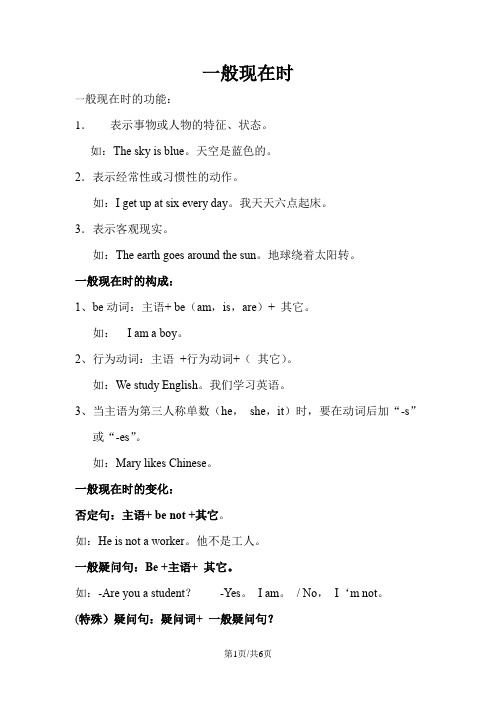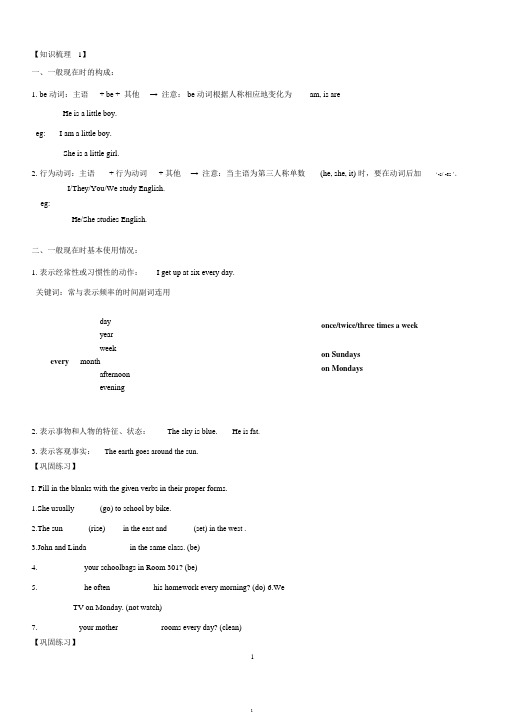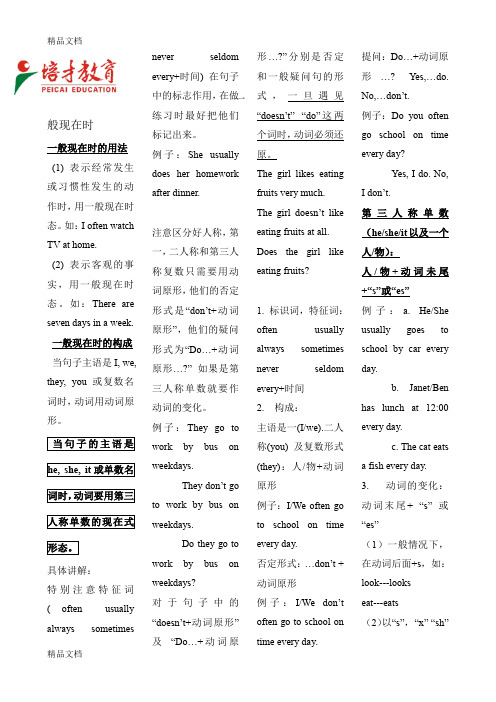四年级下册一般现在时(汇编)
(完整版)四年级下册一般现在时.docx

一般现在时一般在的用法(1)表示常生或性生的作,用一般在。
如:I often watch TV at home.(2)表示客的事,用一般在。
如: There are seven days in a week.一般在的构成当句子主是 I, we, they, you 或复数名,用原形。
当句子的主是he, she, it 或数名,要用第三人称数的在式形。
具体解:特注意特征 ( often usually always sometimes never seldom every+) 在句子中的志作用,在做最好把他出来。
例子: Sheusually does her homework after dinner.注意区分好人称,第一,二人称和第三人称复数只需要用原形,他的否定形式是“don’t+ 原形”,他的疑形式“Do⋯+ 原形⋯?”如果是第三人称数就要作的化。
例子: They go to work by bus on weekdays.They don’ t go to work by bus on weekdays.Do they go to work by bus on weekdays?于句子中的“doesn’ t+原形”及“Do⋯+ 原形⋯?”分是否定和一般疑句的形式,一旦遇“doesn’t ”“两do个” ,必原。
The girl likes eating fruits very much.The girl doesn’ t like eating fruits at all.Does the girl like eating fruits?1. ,特征: often usually always sometimes never seldom every+2.构成:主是一 (I/we). 二人称 (you) 及复数形式 (they):人 /物+原形例子:I/We often go to school on time every day.否定形式:⋯don’t+ 原形例子: I/We don ’t often go to school on time every day.提: Do⋯+ 原形⋯? Yes, ⋯do. No,⋯don’t.例子: Do you often go school on time every day?Yes, I do. No, I don’ t.第三人称数( he/she/it 以及一个人 /物):人 /物 +未尾 +“s或” “es”例子: a. He/She usually goes to school by car every day.b. Janet/Ben has lunch at 12:00 every day.c. The cat eats a fish every day.3.的化:末尾 + “ s或”“ es”(1)一般情况下,在后面+s,如: look---looks eat---eats(2)以“s,”“x” “sh” “ ch尾”的“ o”在尾 +“es,”如: watch---watches wash---washescatch---catches teach---teaches ( 3 )以音字母+“y” 尾的,把“y”改“i再”+“es”,如:fly---flies carry---carriestry---tries(4)特殊形式:have---has4. 否定形式:⋯ doesn’ t+原形例子: The old man plays chess in the morning.The old man doesn’ t play chess in the morning.5.提: Does⋯+ 原形⋯ ? Yes, ⋯ does. No,⋯doesn’ t.例子: Does the old man play chess in the morning?Yes,he does. No, he doesn’ t.巩固正确的答案填空,将其字母号写在前的括号内。
小学四年级时态和语态用法总结

小学四年级时态和语态用法总结一、一般现在时态一般现在时态用来表示经常性的动作、习惯、常态、常规以及现时的判断等。
1. 肯定句结构:主语+ 动词原形/动词第三人称单数形式(he/she/it)+ 其他例如:- I play basketball every day.- She goes to school by bus.2. 否定句结构:主语 + do not/does not(doesn’t)+ 动词原形 + 其他例如:- They do not drink soda.- He doesn’t like swimming.3. 一般疑问句结构:Do/Does + 主语 + 动词原形 + 其他?例如:- Do you like ice cream?- Does he play the piano?4. 特殊疑问句结构:特殊疑问词 + 一般疑问句结构- What do you do in your free time?- Where does she live?二、一般过去时态一般过去时态用来表示过去发生的单个动作或状态。
1. 肯定句结构:主语 + 动词过去式 + 其他例如:- We watched a movie last night.- She studied English for two hours yesterday.2. 否定句结构:主语 + did not(didn’t)+ 动词原形 + 其他例如:- I did not go to the party.- He didn’t finish his homework.3. 一般疑问句结构:Did + 主语 + 动词原形 + 其他?例如:- Did you eat breakfast this morning?- Did they play soccer yesterday?4. 特殊疑问句结构:特殊疑问词 + 一般疑问句结构- When did you go to bed last night?- Where did she buy her new dress?三、一般将来时态一般将来时态用来表示将来某个时间要发生的动作或存在的状态。
英语试卷英语一般现在时题分类汇编

英语试卷英语一般现在时题分类汇编一、单项选择一般现在时1.The teacher told us that light ________ faster than sound.A.travelled B.has travelledC.travels D.was travelling【答案】C【解析】试题分析:直接引语如果是客观事实或真理,变为间接引语时,不管主句用什么时态,间接引语的时态不变。
2.During the quality time at night, the father enjoys watching TV, while the mother together with her three children fond of listening to popular songs.A.is B.are C.was D.were【答案】A【解析】考查主谓一致和时态。
当主语后带有together with短语时,句中的谓语仍然和前面的主语一致,不受together with短语的干扰。
根据enjoys可知,第二个分句也应用一般现在时。
3.Attention, please. The last plane to London ___________ off at 9: 00 pm.A.take B.takesC.took D.has taken【答案】B【解析】考查时态。
句意“请注意。
飞往伦敦的飞机9点起飞。
”按照时间表上的规定时间发送的事情,用一般现在时。
take off“起飞”。
故选B。
4.—Have you got any news of the exam results?—No, but I’ll contact you as soon as I them.A.am getting B.gotC.will get D.have got【答案】D【解析】考查动词时态。
句意:——你有考试结果的消息吗?——没有,但我有了会尽快联系你的。
英语试卷英语一般现在时题分类汇编及解析

英语试卷英语一般现在时题分类汇编及解析一、单项选择一般现在时1.This kind of gel pen which ______ smoothly is quite popular with students.A.is written B.is writing C.wrote D.writes【答案】D【解析】试题分析:句意为:这种写起来非常流畅的中性笔很受学生的欢迎。
部分动词如tear, sell, write等可用主动形式也可用被动形式,当说明事物本身所具备的性质时要用主动表被动的形式,当说明具体的动作时要用被动语态。
Fg: The kind of paper tears easily.说明这种纸易撕烂,是主语的性质。
本题即考查这种笔所具备的特点,故用现在时的主动语态。
A为一般现在时的被动语态,B为现在进行时,C一般过去时。
考点:考查时态语态的用法。
2. you read the instructions closely, you would know what I .A.Had, was B.Should, am C.Had, am D.If, was【答案】C【解析】句意:如果你仔细阅读了说明,你就会知道我现在指的是什么了。
根据句意可知条件状语从句与过去的事实相反,在条件状语从句中,若if省略,需将should /had/were提前。
主句中“我现在指的是什么”是客观事实,故用am。
故选C。
3.Usually Beijing Roast Duck _____ together with special pancakes, green onions and sweet sauce.A.was served B.will serveC.is served D.served【答案】C【解析】考查时态和被动语态。
句意:通常北京烤鸭配上特制的薄煎饼、青葱和甜酱。
句子说的是一般情况,要用一般现在时态;句子主语Beijing Roast Duck是单数第三人称,和谓语动词serve之间是被动关系,所以推知句子要用一般现在时态的被动语态,故答案为C。
小学英语一般现在时态练习题(汇编)

小学英语一般现在时态练习班级:姓名:第一,一般现在时:1.表示事物或人物的特征、状态。
如:The sky is blue.天空是蓝色的。
2.表示经常性或习惯性的动作。
如:I get up at six every day.我每天六点起床。
3.表示客观现实。
如:The earth goes around the sun.地球绕着太阳转。
第二,请看我的面目--构成:1. be动词:主语+be(am,is,are)+其它。
如:I am a boy.我是一个男孩。
2.行为动词:主语+行为动词(+其它)。
如:We study English.我们学习英语。
当主语为第三人称单数(he, she,it)时,要在动词后加"-s"或"-es"。
如:Mary likes Chinese.玛丽喜欢汉语。
第三,我的变化--否定句、一般疑问句、特殊疑问句:1. be动词的变化。
否定句:主语+ be + not +其它。
如:He is not a worker.他不是工人。
一般疑问句:Be +主语+其它。
如:-Are you a student?-Yes. I am. / No, I'm not.特殊疑问句:疑问词+一般疑问句。
如:Where is my bike?2.行为动词的变化。
否定句:主语+ don't( doesn't ) +动词原形(+其它)。
如:I don't like bread.当主语为第三人称单数时,要用doesn't构成否定句。
如:He doesn't often play.一般疑问句:Do( Does ) +主语+动词原形+其它。
如:- Do you often play football?- Yes, I do. / No, I don't.当主语为第三人称单数时,要用does构成一般疑问句。
如:- Does she go to work by bike?- Yes, she does. / No, she doesn't.特殊疑问句:疑问词+一般疑问句。
四年级英语一般现在时练习题50题

四年级英语一般现在时练习题50题1.He often ______ (play) football after school.A.playsB.playC.playingD.to play答案:A。
本题考查一般现在时中第三人称单数的用法。
主语是he,是第三人称单数,谓语动词要用plays。
选项B play 是动词原形,主语不是第一人称、第二人称或复数时不能用;选项C playing 是现在分词,不能单独作谓语;选项D to play 是动词不定式,也不能单独作谓语。
2.She ______ (read) books every day.A.readsB.readC.readingD.to read答案:A。
主语she 是第三人称单数,谓语动词用reads。
选项B read 是动词原形;选项C reading 是现在分词;选项D to read 是动词不定式。
3.They ______ (like) swimming in summer.A.likesB.likeD.to like答案:B。
主语they 是第三人称复数,谓语动词用like 的原形。
选项 A likes 是第三人称单数形式;选项C liking 是现在分词;选项D to like 是动词不定式。
4.My brother ______ (watch) TV in the evening.A.watchesB.watchC.watchingD.to watch答案:A。
主语my brother 是第三人称单数,谓语动词用watches。
选项B watch 是动词原形;选项C watching 是现在分词;选项D to watch 是动词不定式。
5.We ______ (go) to school by bus.A.goesB.goC.goingD.to go答案:B。
主语we 是第一人称复数,谓语动词用go 的原形。
选项 A goes 是第三人称单数形式;选项C going 是现在分词;选项D to go 是动词不定式。
一般现在时总结

water the flowers
She waters the flowers.
play football watch TV They play football in the playground. He watches TV in the sitting-room.
以字母s, x, ch, sh或o结尾的动词,在词尾直接加-es.
添加标题
watch---watches wish---wishes
添加标题
do---does go---goes
添加标题
以“辅音字母加 - y”结尾的动词,要先变y为i再加-es.
添加标题
Exercises
01
Is he happy? Yes, he is happy. Is he strong? Yes, he is strong.
What is it? It is a cat. Is she busy? Yes, she is busy.
Am I sad? No, I am happy. Is it very hot? Yes, it is very hot.
He is happy.
01
否定句:
单击此处添加正文,文字是您思想的提炼,为了演示发布的良好效果,请言简意赅地阐述您的观点。
否定回答:
He is not (isn’t) happy. Is he happy?
04
一般疑问句:
单击此处添加正文,文字是您思想的提炼,为了演示发布的良好效果,请言简意赅地阐述您的观点。
否定句: 一般疑问句: 肯定回答: 否定回答:
Yes, they are.
一般现在时语法(汇编)

一般现在时一、一般现在时的定义:表示现在经常性、习惯性、规律性的动作或者现在存在的状态的一种时态。
二、一般现在时的用法当一般现在时表示现在经常性、习惯性的动作时常连用的时间状语:1)表示频度的副词:always, often, usually, sometimes2)on Sundays, on Monday afternoons, every day/week/month/year等时间状语3)once a year, twice a month, three times a week 等表示频度的词组三、一般现在时的构成1) 谓语动词为be (am ,is ,are) (主语+be+其他)I am a teacher. You are a student. He/She is a doctor.2)谓语动词为实义动词(主语+do/does+其他)I like English. (Chinese,Math,Science,History,Geography,Physics,Chemistry,Sociology) Mike likes English. (Chinese,Math,Science,History,Geography,Physics,Chemistry,Sociology) Mike speaks good English.I go to school on foot (by school bus,by bus,by bike).Lily goes to school on foot (by school bus,by bus,by bike).Tony often watches TV in the evening.Jack always washes in cold water.Mike studies English,Chinese,Math at school.Sona has musical talent.四、动词第三人称单数变化规则▲第三人称单数:he/she/it; 可数名词单数;不可数名词.(口诀:不是你不是我,并且只有一个)五、句型转换1、谓语动词为be动词否定:主语+be+not+其他一般疑问句:be+主语+其他(即将be提到句首)2、谓语动词为实义动词肯定:主语+do/does+其他否定:主语+助动词do/does+not+动词原形+其他疑问:Do/Does+主语+其他回答:肯定:Y es,主语+do/does. 否定:No,主语+do/does+not.注意:don’t 和doesn’t 之后动词一定要用原形。
四年级英语一般现在时练习50题

四年级英语一般现在时练习50题1.She _____ to school by bus every day.A.goB.goesC.goingD.to go答案:B。
一般现在时中,当主语是第三人称单数时,动词要用第三人称单数形式。
she 是第三人称单数,go 的第三人称单数形式是goes。
2.We _____ our homework in the evening.A.doB.doesC.doingD.to do答案:A。
we 是第一人称复数,一般现在时中动词用原形。
3.He _____ football on Sundays.A.playB.playsC.playingD.to play答案:B。
he 是第三人称单数,play 的第三人称单数形式是plays。
4.They _____ books in the library.B.readsC.readingD.to read答案:A。
they 是第三人称复数,一般现在时中动词用原形。
5.I _____ swimming in summer.A.goB.goesC.goingD.to go答案:A。
I 是第一人称单数,一般现在时中动词用原形。
6.My mother _____ cooking every day.A.doB.doesC.doingD.to do答案:B。
my mother 是第三人称单数,do 的第三人称单数形式是does。
7.My father _____ to work by car.A.goB.goesC.going答案:B。
my father 是第三人称单数,go 的第三人称单数形式是goes。
8.My sister _____ music.A.likeB.likesC.likingD.to like答案:B。
my sister 是第三人称单数,like 的第三人称单数形式是likes。
9.I _____ to school on foot.A.goB.goesC.goingD.to go答案:A。
实义动词的一般现在时练习(汇编)

实义动词的一般现在时练习一、句型转换1.She often does her homework after supper .(改为一般疑问句)______ she often _____ her homework after supper ?2. We have three meals a day . .(改为一般疑问句)_____ you _____three meals a day ?3. Jack studies English very hard .(改为否定句)Jack ______ ______ English very hard .4. They have lunch at school every day .(改为否定句)They _____ ______ lunch at school every day .(就画线部分提问)_____ _____ you ____ at school every day ?5.Do you often play football after school?(肯定回答)6.I have many books.(改为否定句)7.Gao Shan’s sister likes playing table tennis .(改为否定句)8.She lives in a small town near New York.(改为一般疑问句)9. I watch TV every day. (改为一般疑问句)10. David has got a goal. (改为一般疑问句)11. We have four lessons.(否定句)12. Nancy doesn’t run fast (肯定句)13. My dog runs fast. 否定/一般疑问句:14.Mike has two letters for him. 一般疑问句/否定句:15.I usually play football on Friday afternoon.否定句二、用适当的形式填空:1.I __(play)soccer every day.2.He often___(watch) TV at home.3.Tom__(have) breakfast at home.4.My teacher usually __(go)home late.5.He__(get) up at 6 o'clock.6.I__(have) many books.7.She __(have) two birds.8.Linda __(want) to go to Beijing.9.Ben usually__(study) English on Sunday.改句子。
四年级下册英语一般现在时讲解和练习译林版

一般现在时一般现在时的功能:1.表示事物或人物的特征、状态。
如:The sky is blue。
天空是蓝色的。
2.表示经常性或习惯性的动作。
如:I get up at six every day。
我天天六点起床。
3.表示客观现实。
如:The earth goes around the sun。
地球绕着太阳转。
一般现在时的构成:1、be动词:主语+ be(am,is,are)+ 其它。
如:I am a boy。
2、行为动词:主语+行为动词+(其它)。
如:We study English。
我们学习英语。
3、当主语为第三人称单数(he,she,it)时,要在动词后加“-s”或“-es”。
如:Mary likes Chinese。
一般现在时的变化:否定句:主语+ be not +其它。
如:He is not a worker。
他不是工人。
一般疑问句:Be +主语+ 其它。
如:-Are you a student?-Yes。
I am。
/ No,I‘m not。
(特殊)疑问句:疑问词+ 一般疑问句?如:Where is my bike?2。
行为动词的变化。
否定句:主语+ don’t(doesn‘t )+ 动词原形(其它)。
如:I don’t like bread。
当主语为第三人称单数时,要用doesn‘t构成否定句。
如:He doesn’t often play。
一般疑问句:Do+主语+动词原形+(其它)?如:Do you often play football?- Yes,I do。
/ No,I don‘t。
当主语为第三人称单数时,要用does构成一般疑问句。
如:- Does she go to work by bike?- Yes,she does。
/ No,she doesn’t。
主语为第三人称单数时,动词的变化规则1.一般情况下,直接加-s,如:cook-cooks,milk-milks 2.以s、x、sh、Ch、o结尾,加-es,如:guess-guesses,wash-washes,go-goes2.以“辅音字母+ y”结尾,变y为i,再加-es,如:study-studies一般现在时用法专练:一、写出下列动词的第三人称单数drink ________ go _______ stay ________make________look_________ have_______pass_______ carry ____come________watch______ plant_______ fly ________study_______ brush________ do_________teach_______wash_______二、用括号内动词的适当形式填空。
一般现在时现在进行时一般过去时

但当主语是第三人称单数时,谓语动词形式有变化,一般在动词
末尾加s,否定句在行为动词前加doesn’t, 一般疑问句在句前加 does 动词三单的变化: 1、一般动词后加s,如:reads,plays,works,makes 2、以 s,x,ch,sh, 结尾,后加es. 如:watches, 3、以辅音字母加o结尾,一般加es ,如:does,goes 4、辅音字母+y结尾的单词,去y,加ies,如:worries
2.表经常或习惯性的动作: e.g. I get up at 6:30 every day. He reads English every morning.
3.表主语具备的性格和能力等: e.g. She likes noodles. They speak French.
4.普遍真理和自然规律: e.g. Two plus four is six. The moon goes around the earth.
What do you often do on the Internet?
6.He has lunch at school.
Who has lunch at school? Where does he have lunch?
Do you know?
第一人称和第二人称的一般现在时,其谓语动词没有形式的变化,
对下列句子画线部分提问: 1. I get up at six o’clock.
When do you get up?
2. They usually go to the park on Sunday.
What do they usually do on Sunday?
小学四年级英语语法专项:一般现在时

【知识梳理1】一、一般现在时的构成:1. be 动词:主语+ be + 其他→ 注意: be 动词根据人称相应地变化为am, is areHe is a little boy.eg:I am a little boy.She is a little girl.2. 行为动词:主语+ 行为动词+ 其他→ 注意:当主语为第三人称单数(he, she, it) 时,要在动词后加‘-s/ -es ’。
I/They/You/We study English.eg:He/She studies English.二、一般现在时基本使用情况:1. 表示经常性或习惯性的动作:I get up at six every day.关键词:常与表示频率的时间副词连用dayyearweekevery monthafternoonevening2. 表示事物和人物的特征、状态:The sky is blue.He is fat.3. 表示客观事实:The earth goes around the sun.【巩固练习】I. Fill in the blanks with the given verbs in their proper forms.1.She usually ______(go) to school by bike.2.The sun ______(rise)in the east and ______ (set) in the west .3.John and Linda __________ in the same class. (be)4.__________ your schoolbags in Room 301? (be)5.__________ he often __________ his homework every morning? (do)6.We __________ TV on Monday. (not watch)7.__________ your mother __________ rooms every day? (clean)【巩固练习】once/twice/three times a weekon Sundayson MondaysI.选择最恰当的答案() 1. _______ you have a book?A. DoB. AreC. IsD. Have() 2. They ________ on a farm.A. workingB. is workC. workD. is worked() 3. ---- Does Peter like to watch TV?---- _________.A. Yes, he likesB. No, he doesn’tC. Yes, he’ d likeD. No, he likes() 4. She doesn’ t _________ her homework in the afternoon.A. doingB. to doC. doesD. do() 5. How _________ Mr. Brown _________ to America?A. do, goB. is, goC. does, goD. does, goes() 6. Where ’ s my camera? I __________ it.A. am not findingB. am not seeingC. can ’ t findD. can ’t look at() 7. ---- How _________ he go to work?---- He _________ to work by bike.A. does; goB. do; goesC. do; goD. does; goes() 8. ---- ______ you usually late for school?---- No, _____________.A. Do; I amB. Does; notC. Are; I’ m notD. Are; I aren’t () 9. _______ she ________ home at six every day?A. Is, leaveB. Does, leaveC. Is, leavesD. Does, left() 10. Mr. Yang __________ English this term.A. teaches ourB. teaches usC. teach usD. teach our【知识梳理2】be 动词,行为动词句型:1.Be动词一般现在时的句型肯定句: sb+ be+其他be 根据人称变为am, is, areeg: He is a teacher.I am a student.They are workers.否定句: sb+ be+not+其他eg: He is not a teacher.I am not a student.They are not workers.一般疑问句: be+sb+其他Is he a teacher?-Yes, he is. / No, he isn’ t.Are you a student?Are they workers?特殊疑问句: What is he?2. 行为动词的变化肯定式: sb +do+ 其他eg: I like pork.第三人称单数:sb+does+ 其他eg: He likes pork.否定式: sb +don ’其t+他eg:I don’ t like pork. 第三人称单数:sb+doesn ’其t+他eg: He doesn’ t like pork.一般疑问句 : Do+ sb + 其他第三人称单数:Does + sb +其他eg: Do you like pork?eg:Does he like pork?-Yes, I do. / No, I don’ t.-Yes, he does. / No, he doesn .’t 特殊疑问句:What do you like? / What does he like?【例题精讲】1.按要求改写句子:1.Do you often play football after school? ( 肯定回答 ) __________________________________________.2.I have many books. (改为否定句) ___________________________________________.3. Gao Shan’ s sistereslikplaying table tennis (改为否定句)______________________________________________.4.She lives in a small town near New York. ( 改为一般疑问句) ______________________________________________.5.I watch TV every day. (改为一般疑问句) _______________________________________________ .【巩固练习】1.用括号内动词的适当形式填空1.He often ________ (have) dinner at home.2.Daniel and Tommy _______ (be) in Class One.3.We _______ (not watch) TV on Monday.4.Nick _______ (not go) to the zoo on Sunday.5.______ they ________ (like) the World Cup?6.What _______they often _______ (do) on Saturdays?7._______ your parents _______ (read) newspapers every day?8.The girl _______ (teach) us English on Sundays.9.She and I ________ (take) a walk together every evening.10.There ________ (be) some water in the bottle.基础题:I.用括号内动词的适当形式填空1.Mike _______ (like) cooking.2.They _______ (have) the same hobby.3.My aunt _______ (look) after her baby carefully.4.You always _______ (do) your homework well.5. I _______ (be) ill. I’ m staying in bed.6.She _______ (go) to school from Monday to Friday.7.Liu Tao _______ (do) not like PE.8.The child often _______ (watch) TV in the evening.9.Su Hai and Su Yang _______ (have) eight lessons this term.10. ---- What day _______ (be) it today? ---- It ’ s Saturday.II.按要求改写句子。
小学英语四年级下册各时态语法大全

小学英语四年级下册各时态语法大全英语四年级下册各时态语法大全课外学习活动的内容和时间要适当,不要影响正常的课堂学习和身体锻炼。
在课外学习活动中,要尽力做到理论联系实际,学练结合,脑手并用。
课件小编准备了《英语下册各时态语法大全》,供大家参考。
小学下册语法知识点一:一般现在时一般现在时的功能1.表示事物或人物的特征、状态。
如:The sky is blue.天空是蓝色的。
2.表示经常性或习惯性的动作。
如:I get up at six every day.我每天六点起床。
3.表示客观现实。
如:The earth goes around the sun.地球绕着太阳转。
一般现在时的标志词:often,usually,sometimes,every 等一般现在时的构成主语+动词原形。
如:We study English. 我们学习。
当主语为第三人称单数(he,she,it,my father等)时主语(三单)+动词的三单形式(要在动词后加如:Mary likes Chinese.玛丽喜欢汉语。
一般现在时的变化否定句:主语+ don't(doesn't )+动词原形(+其它)。
如:I don't like bread. He doesn't like bread,too.一般疑问句:Do(Does )+主语+动词原形+其它。
如:Do you go to school by bike? Yes,I do. / No,I don't.当主语为第三人称单数时,要用does构成一般疑问句。
如:Does she go to school by bike? Yes,she does. / No,she doesn't.特殊疑问句:特殊疑问词+一般疑问句。
如:How dou you go to school? How does your father go to work?动词的第三人称单数的变化规则1.一般情况下,直接加-s,如:cook-cooks,make-makes2.以s. x. sh. ch. o结尾,加-es,如:wash-washes,watch-watches,go-goes3.以“辅音字母+y”结尾,变y为i,再加-es,如:study-studies 但play-plays不规则变化:have-has小学四年级下册英语语法二:现在进行时1.现在进行时表示现在正在进行或发生的动作,也可表示当前一段时间内的活动或现阶段正在进行的动作。
最新四年级下册一般现在时

一般现在时一般现在时的用法 (1) 表示经常发生或习惯性发生的动作时,用一般现在时态。
如:I often watch TV at home. (2) 表示客观的事实,用一般现在时态。
如:There are seven days in a week. 一般现在时的构成 当句子主语是I, we, they, you 或复数名词时,动词用动词原形。
具体讲解: 特别注意特征词( often usually always sometimesnever seldom every+时间) 在句子中的标志作用,在做练习时最好把他们标记出来。
例子:She usually does her homework after dinner.注意区分好人称,第一,二人称和第三人称复数只需要用动词原形,他们的否定形式是“don’t+动词原形”,他们的疑问形式为“Do…+动词原形…?” 如果是第三人称单数就要作动词的变化。
例子:They go to work by bus on weekdays.They don’t go to work by bus on weekdays.Do they go to work by bus on weekdays?对于句子中的“doesn’t+动词原形” 及 “Do…+动词原形…?”分别是否定和一般疑问句的形式,一旦遇见“doesn’t” “do”这两个词时,动词必须还原。
The girl likes eating fruits very much. The girl doesn’t like eating fruits at all. Does the girl like eating fruits?1. 标识词,特征词:oftenusuallyalways sometimes neverseldomevery+时间 2. 构成: 主语是一(I/we).二人称(you) 及复数形式(they):人/物+动词原形例子:I/We often go to school on time every day.否定形式:…don’t + 动词原形例子:I/We don’t often go to school on time every day.提问:Do…+动词原形…?Yes,…do.No,…don’t. 例子:Do you often go school on time every day?Yes, I do. No, I don’t.第三人称单数(he/she/it 以及一个人/物):人/物+动词未尾+“s”或“es” 例子:a. He/She usuallygoestoschool by car every day.b. Janet/Ben has lunch at 12:00 every day.c. The cat eats a fish every day. 3. 动词的变化:动词末尾+ “s” 或“es”(1)一般情况下,在动词后面+s ,如:look---looks eat---eats(2)以“s”, “x” “sh”ch” “o”结尾的单词在词尾+“es”,如:watch---watcheswash---washes catch---catchesteach---teaches(3)以辅音字母+“y”结尾的单词,把“y”改为“i”再+“es”,如:fly---flies carry---carriestry---tries(4)特殊形式:have---has4. 否定形式:…doesn’t+动词原形例子:The old man plays chess in the morning.The old man doesn’t play chess in the morning.5.提问:Does…+动词原形…? Yes,…does. No,…doesn’t.例子:Does the old man play chess in the morning?Yes,he does. No, he doesn’t.巩固练习选择正确的答案填空,将其字母编号写在题前的括号内。
英语试卷英语一般现在时题分类汇编含解析

英语试卷英语一般现在时题分类汇编含解析一、单项选择一般现在时1.Honesty ___________ an important role in a child’s ability to succeed in school and later life. A.played B.playsC.had played D.has played【答案】B【解析】试题分析:考查时态。
句意:诚实对一个孩子在学校和以后生活中取得成功的能力起着重要的作用。
表示客观事实用一般现在时态,Honesty是第三人称单数形式,故选B。
考点:考查时态2.That children ______meet with setbacks is a matter of necessity as they_____, so parents don’t worry about that.A.shall; grew up B.must; grew up C.can; grow up D.will; grow up【答案】D【解析】考查情态动词和时态。
will 表示“不可避免性”。
如:Boys will be boys. 句中的don’t worry说明了该句用一般现在时。
3.Experience is a hard teacher because she ________ the test first, the lesson afterwards. A.gives B.has given C.was giving D.would give【答案】A【解析】句意:经验是一名苛刻的老师,因为她总是先考试再给你上课。
表达的是客观事实,要用一般现在时态;主语she是第三人称单数,谓语动词give要用第三人称单数形式,故选A。
【名师点睛】一般现在时表示通常性、规律性、习惯性、真理性的状态或者动作有时间规律发生的事件的一种时间状态。
在使用时尤其要注意主语是第三人称单数时,谓语动词要用三单形式,比如本题gives。
小学四年级下英语一般现在时

You are Great!!
一般现在时态
S 是小偷 跟着it 、she、 he的动作 it 、she、 he sleeps/reads…/draws…/plays… goes…/does…/watches… do/does 两人是一对警察好朋友,警察出现,小偷 不见。 Does 帮助it、she、he
经常 放学后
school
有时
sometimes
at
the weekend
在周末
What
does he often do?
He often does
homework after school.
after
school
What
does he often do?
often reads books after school
Does he read books after school? What does he often do after school? Do 帮助you and me Do you sleep at weekend? What do you often do at weekend?
What
see you !!
He
What
does he often do?
often watches TV at the weekend.
He
at
weekend
What
does Rabbit often do at the weekend?
- 1、下载文档前请自行甄别文档内容的完整性,平台不提供额外的编辑、内容补充、找答案等附加服务。
- 2、"仅部分预览"的文档,不可在线预览部分如存在完整性等问题,可反馈申请退款(可完整预览的文档不适用该条件!)。
- 3、如文档侵犯您的权益,请联系客服反馈,我们会尽快为您处理(人工客服工作时间:9:00-18:30)。
一般现在时一般现在时的用法 (1) 表示经常发生或习惯性发生的动作时,用一般现在时态。
如:I often watch TV at home. (2) 表示客观的事实,用一般现在时态。
如:There are seven days in a week. 一般现在时的构成 当句子主语是I, we, they, you 或复数名词时,动词用动词原形。
具体讲解: 特别注意特征词( often usually always sometimesnever seldom every+时间) 在句子中的标志作用,在做练习时最好把他们标记出来。
例子:She usually does her homework after dinner.注意区分好人称,第一,二人称和第三人称复数只需要用动词原形,他们的否定形式是“don’t+动词原形”,他们的疑问形式为“Do…+动词原形…?” 如果是第三人称单数就要作动词的变化。
例子:They go to work by bus on weekdays.They don’t go to work by bus on weekdays.Do they go to work by bus on weekdays?对于句子中的“doesn’t+动词原形” 及 “Do…+动词原形…?”分别是否定和一般疑问句的形式,一旦遇见“doesn’t” “do”这两个词时,动词必须还原。
The girl likes eating fruits very much. The girl doesn’t like eating fruits at all. Does the girl like eating fruits?1. 标识词,特征词:oftenusuallyalways sometimes neverseldomevery+时间 2. 构成: 主语是一(I/we).二人称(you) 及复数形式(they):人/物+动词原形例子:I/We often go to school on time every day.否定形式:…don’t + 动词原形例子:I/We don’t often go to school on time every day.提问:Do…+动词原形…?Yes,…do.No,…don’t . 例子:Do you often go school on time every day?Yes, I do. No, I don’t.第三人称单数(he/she/it 以及一个人/物):人/物+动词未尾+“s”或“es” 例子:a. He/She usuallygoestoschool by car every day.b. Janet/Ben has lunch at 12:00 every day.c. The cat eats a fish every day. 3. 动词的变化:动词末尾+ “s” 或“es”(1)一般情况下,在动词后面+s ,如:look---looks eat---eats(2)以“s”, “x” “sh”ch” “o”结尾的单词在词尾+“es”,如:watch---watcheswash---washes catch---catchesteach---teaches(3)以辅音字母+“y”结尾的单词,把“y”改为“i”再+“es”,如:fly---flies carry---carriestry---tries(4)特殊形式:have---has4. 否定形式:…doesn’t+动词原形例子:The old man plays chess in the morning.The old man doesn’t play chess in the morning.5.提问:Does…+动词原形…? Yes,…does. No,…doesn’t.例子:Does the old man play chess in the morning?Yes,he does. No, he doesn’t.巩固练习选择正确的答案填空,将其字母编号写在题前的括号内。
()1. My mother_______ housework every day.A. didB. doC. does()2. The lion doesn’t______ the net three times a day.A. bitedB. biteC. biting()3. He______ a big hole every week.A. makesB. is makingC. made()4.Does the cat______ a mouse every hour?A. catchB. catchingC. catches()5.He usually_______ the earth to the hill.A. carryB. carriesC. carrys()6. My mother always_______ up at half six.A. gotB. getC. gets()7. She often_____ under a big tree and _____ books in the morning.A. sit…readsB. sits…readC. sits…reads()8. ______ the boy ______ TV on weekdays?A. Do…watchesB. Does…watchC. Do…watch ()9.Their friend______ to the park every two days.A. goB. goesC. going()10.He never______ a lot of water after he_____ football.A. drinks…playB. drinks…playsC. drink…plays ()11. ____your mother _____ a car to get there every day?A. Does…driveB. Do…driveC. Do…drives()12. He seldom______ anything.A. forgetB. forgotC. forgets()13. She often______ over when she______ the baton.A. falls…getsB. falls…getC. fall…gets()14.Janet______ the dog every morning.A. feedB. feedingC. feeds()15.My father_______ well in the evening every day.A. doesn’t feelB. don’t feelC. doesn’t feel s (二.在下面的动词后加-s或-es .(1) catch_________ (2) go_________ (3) cost_________(4)fish________ (5)listen_________ (6)do____________(7) fall________ (8)show__________ (9)brush__________ (三. 翻译。
1.I often __________ __________(看电视)in the evening.2.Jack __________ __________(踢足球) every afternoon.3.Jane _______ _______(购物)with her mother on the weekend.4.They all __________(喜欢)English teacher.5.Jack often __________(睡觉)at ten.6.Do they __________ __________(吃晚饭)at home?7.We often__________(跳舞)in music class.8.A chair__________(有)four legs.(四).用适当的动词形式填空.(1) Wang Xin usually_________(get) up at 6:30. He________(get) up now .(2) Meihua usually_________(clean) his bedroom on Sund ay. Now it’s nine o’clock.He_________(clean) his bedroom.(3) Bill_________(not like) skipping. He_________(like) running.(4) My mother_________(make) noodles on Sunday. She_________(not make) pasta.(5) -_________ your sister_________(like) coffee? -No, but she_________(like) tea.(6) The bird sometimes_________(fly) high.(7) Today_________(be) my 12th birthday. My grandmother _________(give) me a doll.(8) The girl usually_________(plant) many plants in the spring every year.(9) Our music teacher_________(teach) us music on Monday afternoon.(10) He usually_________ (water) them in the morning.(11) He always_________(clean) slowly and ________(look) left and right(12) The young lady_________(clean) her bedroom every afternoon.(13) She never_________(go) to school late, and she always _________(do) well in class.(14) Usually, Tom _________(water) them two times a day.(15) May usually_________ (plant) many trees in spring.(五).仿照例句, 写出下列动词的形式.例: sing sings singing(1)cut____________ _____________ (2) catch_____________ ____________(3)swim____________ ____________ (4) take_____________ ____________(5)get____________ _____________ (6) run___________ _____________(7)ask___________ ______________ (8)brush_____________ ____________。
